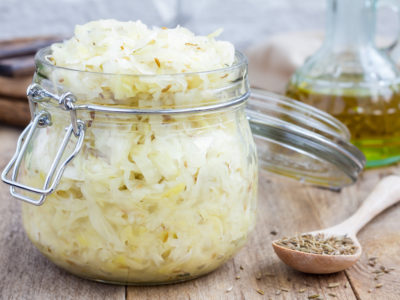Table of Contents[Hide][Show]
- What Are Kefir Grains?
- Making the Most of Your Kefir
- Here’s What You Get from Kefir
Awesome Health Benefits of Consuming Kefir Grains+−
- 1. Helps Fight Cancer Due to the Polysaccharides and Peptides
- 2. Boosts Immunity by Modulating the Immune System
- 3. May Help Reduce Bloating by Diversifying Gut Bacteria
- 4. Builds Bone Density Due to High Calcium Content
- 5. Fights Allergies with the Help of Vitamin D Content
- 6. Improves Lactose Digestion with Beneficial Yeast
- 7. Promote Balance in Microbial Flora by Increasing Good Bacteria
- Probiotics for Diabetics: How Your Gut Microbiome Helps Maintain Healthy Blood Sugar
- 8. Supports Detoxification to Get Rid of Toxins in the Body
- 9. The Best Bang for Your Buck
- Kefir vs Yogurt
- DIY Kefir Recipe
What Are Kefir Grains?
Kefir grains are all the rage these days, but do you know why? We are hearing more and more about how important it is to consume fermented foods.
This one may contain the fountain of youth. Luckily, the secret of kefir is out, and it is not only tasty but also a super player in the probiotic playbook.
Kefir “grains” look like a bunch of cauliflower or little white “brains.” They are a living culture of lactic acid bacteria/yeast, which occurs in nature. (So for those reading this who are gluten-free, you have nothing to worry about!)
They also contain a polysaccharide called kefiran. It is a product of Lactobacillus kefiranofaciens and contains equal parts of galactose and glucose.
They may also have other colonies of microorganisms. These include Lactococcus lactis, Leuconostoc mesenteroides, and Acetobacter orientalis.
Utilizing specific concepts of dairy science, these grains turn milk into a health bomb by feeding on the milk sugars, fermenting, and making a fizzy yogurt-like drink.
They are traditionally added to cow’s milk, but you can also use water, fruit juice, soy milk, nut or coconut milk, or another plant-based milk. That’s why you have milk kefir grains and water kefir grains, depending on the method you use.
Depending on your brew, it can even sometimes have a little sour/tangy beer-like flavor or taste. This is because it contains yeast which can break down its chemical composition into alcohol and carbon dioxide.
If you like it on the sweeter side, you can add a touch of fruits or sweeteners, and you are good to go.
There are tons of delicious berry-flavored kefirs at grocery stores, all ready for your enjoyment. They are thinner in consistency than yogurt, and go down like an easy-to-drink milkshake.
Making the Most of Your Kefir
Who knew you could substitute kefir in any recipe that calls for buttermilk? You can also enjoy kefir in salad dressings, make gourmet cheese with it, or add it to your morning smoothie.
You can even separate out the whey and use that to make fermented veggies and pickles. To increase beneficial bacteria in the gut, alternate it with kombucha.
It’s also possible to buy dried curds or dehydrated kefir grains. They are a practical option if you want to travel and bring some kefir with you.
Here’s What You Get from Kefir
Today, drinking kefir is a popular wellness trend with numerous health benefits. Just a 6-oz serving of this probiotic drink contains all of this goodness:
- 100 calories
- Carbohydrate: 7-8 grams
- Fat: 3-6 grams
- Protein: 6 grams
- Calcium: 20% of the RDA
- Phosphorus: 20% of the RDA
- Vitamin B12: 14% of the RDA
- Riboflavin (B2): 19% of the RDA
- Magnesium: 5% of the RDA
- A decent amount of vitamin D, K2, organic acids, and peptides
Note: RDA stands for recommended dietary allowance. It is the ideal amount of nutrients you need daily to keep your body healthy.
Awesome Health Benefits of Consuming Kefir Grains
Hidden away in the Caucasus Mountains, Russian scientist and father of immunology Elie Metchnikoff was curious about longevity. He studied a Bulgarian community that had an unusually large number of centenarians.
These communities drank “sour milk” every day. They were poor but not poor in health because of this probiotic-rich food.
This was back in 1907 when the average mortality rate in France was 40 years of age. This was the first foray into the connection between gut bacteria and great health.
These reasons, in addition to the following ones, explain why some people call kefir grains the ultimate cultures for health and still drink them to this day.
1. Helps Fight Cancer Due to the Polysaccharides and Peptides
Many studies highlight the purported anti-cancer properties of kefir grains. Their polysaccharides and peptides can initiate cellular death (apoptosis), which decreases the chances of metastasis.
A 2016 study illustrated the health benefits of kefir against breast cancer cells. Based on the results, the tumor cells decreased in size and weight while the helper T-cells (fighter cells) increased.
2. Boosts Immunity by Modulating the Immune System
Kefir grains may be able to modulate the immune system. This means it prevents the body’s own defense system from going into overdrive.
When the immune system is in a hyper state, it can increase the risks of certain conditions. These can include chronic inflammation and allergic reaction.
3. May Help Reduce Bloating by Diversifying Gut Bacteria
Inflammatory bowel diseases such as Crohn’s disease and ulcerative colitis leave lesions on the gut. They can result in symptoms such as bloating, abdominal pain, vomiting, and nausea.
A 2019 study revealed kefir grains may help reduce the symptoms such as bloating, especially for patients with Crohn’s disease. This may be because these grains help modulate and diversify the gut bacteria.
4. Builds Bone Density Due to High Calcium Content
Getting older also affects bone density. When it decreases, it can increase the likelihood of osteoporosis, wherein the bones become brittle.
Kefir grains are like milk in that they contain high amounts of calcium necessary to build strong bones. They also have magnesium, which supports calcium absorption.
5. Fights Allergies with the Help of Vitamin D Content
Kefir can help fight allergies by improving the conditions of the gut and modulating the function of the immune system. It also has good amounts of vitamin D, which also plays a crucial role in reducing allergy symptoms.
This vitamin is necessary for regulating the immune system. It also influences the development of the lungs, which may minimize the risks of asthma.
6. Improves Lactose Digestion with Beneficial Yeast
Many people suffer from lactose intolerance. Kefir grains can help in this area by providing your body with beneficial yeast and microbial culture. These microorganisms can digest lactose, lowering the substance’s effect on the body.
Since kefir is so versatile, there is always the option to go with water kefir or one using a plant-based milk as well.
7. Promote Balance in Microbial Flora by Increasing Good Bacteria
Candida, the fungus responsible for yeast infections, can occur for a variety of reasons. It may be due to the intake of antibiotics, uncontrolled diabetes, or poor eating habits.
Other factors can include sleep deprivation, weakened immune system, or hormonal imbalances. Most of these point toward a primary problem: gut imbalance.
Kefir grains promote balance in the microbial flora by increasing the number of good or beneficial bacteria. They can also diversify the microorganisms in the intestines.
Related
Probiotics for Diabetics: How Your Gut Microbiome Helps Maintain Healthy Blood Sugar
Probiotics for diabetics can make a big impact in managing and even preventing this disease. Learn how probiotics help maintain healthy glucose levels and blood pressure, improve insulin sensitivity, promote heart health, and more.
8. Supports Detoxification to Get Rid of Toxins in the Body
Detoxification is the body’s natural way of healing. It is when your body gets rid of the substances and wastes that should not be inside you in the first place.
There are many ways to detox, and one of the options is drinking kefir. The live yeast and bacteria in the body can stimulate the cleansing process.
9. The Best Bang for Your Buck
Kefir has about 30 strains of yeast and bacteria. About 75% of our immune health begins in the gut.
Kefir is unique in that it can actually set up shop and colonize your gut with healthy bacteria. It is also antibacterial and will fight “bad bacteria” like Salmonella and E. coli.
Kefir vs Yogurt
Now, we all know and love yogurt, but did you know that kefir is unique in its ability to colonize your gut whereas yogurt probiotics are transient?
Yogurt only contains probiotic bacteria while kefir contains both probiotics and yeast. Kefir is also the winner in diversity of probiotic strains with approximately 30 versus two main types of bacteria in yogurt.
The probiotics in yogurt can still be beneficial, but don’t underestimate the healing benefits of kefir.
DIY Kefir Recipe
You can buy kefir grains in many places these days, but you can also make your own kefir. With just a few kitchen tools, you can make this at home.
There are claims that there are more microbes in home-grown kefir. It’s about 30 versus 12 from store-bought kefir. That’s why kefir recipes are so popular!
For the fermentation process in making kefir, you will need:
- Kefir grains
- A clean glass jar
- Milk or other milk alternative to culture
- Strainer
Directions:
- Add 1-2 tablespoons of kefir grains in a jar.
- Add 2 cups of milk.
- Leave the mixture for 24 hours at room temperature.
- Strain the kefir grains out. Place the viscous liquid in a bottle.
- Refrigerate the finished kefir, and voila, start again for a new batch!
You can do a secondary fermentation to bring down the sour flavor and increase B vitamins. Add orange peel, vanilla beans, or any kind of fruit.
Let it sit and ferment for another 12 to 24 hours, and it will get even bubblier. You can add this kefir to smoothies.
To make it even healthier, put a few drops of the organic Turmeric PuraThRIVE.
If it separates, don’t be afraid, you can still drink it. It may be super sour, but it is just fine.
Your kefir grains have probably multiplied to the point where you need to divide and give the extra grains to a few friends.
If you make kefir cheese, drain the whey and then use the whey for soda. Put it in the fridge overnight.
You can even save the whey for cultured vegetables! Kefir is so versatile!
Additional Considerations
People who are recovering from a serious illness should always consult their doctor when adding new or fermented foods to their diet. It is possible to experience abdominal pain or diarrhea.
Commercial brands can contain a lot of sugar to balance the sour flavor, so read the label. You can also improve your digestion when you’re sick by consuming alkaline greens at the same time. This 100% raw and organically produced green superfood powder is a good source of dietary fiber for proper digestion and bowel movements and also helps to strengthen the immune system. Give it a try today and save 20% with code Well20.
Fun Facts About Kefir Grains
- Most Americans pronounce “kefir” as “KEE-fur.” The correct pronunciation is “kuh-FEAR.”
- Thousands of years ago, the locals in the Caucasus Mountains believed the grains were a gift from Muhammad. They were treated like precious jewels.
- These grains gave their communities the wealth of superior health even though they were poor.
- The grains were a guarded secret because of their health-giving properties. A Russian spy was able to get some and, luckily for us, spread them throughout Russian and Eastern Europe and now across the globe.
- There are even stories that the grains were actual manna from heaven when the Israelites wandered the desert for 40 years.
- The word “kefir” is derived from the Turkish word keyif. It means “long life” or “good life” or good feeling after eating, so on that note, enjoy!
Closing Thoughts
Indeed, kefir grains can do more than improve your smoothies. They are some of your best allies in maintaining optimal health.
Make the most out of them by incorporating them into your meals. Combine them with other nutrient-dense foods such as greens and fermented foods.
You May Also Like…
Editor’s Note: This post was originally published on March 1, 2017, and has been updated for quality and relevancy most recently on July 27, 2021.





